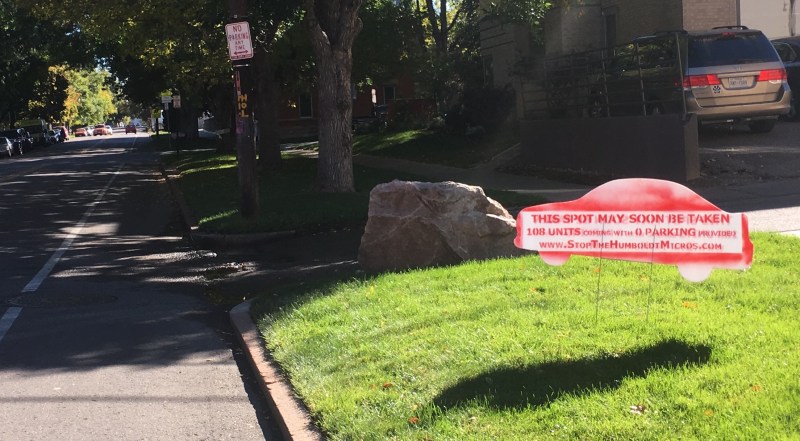City Council Caves to the Anti-Housing, Pro-Parking Crowd Again

It’s 2017. The question of whether cities should require developers to build parking has been settled. They should not.
Forcing developers to build expensive parking spaces — at a cost of $18,000 to $26,000 per stall — makes housing more expensive for everyone. And as UCLA economist Donald Shoup famously wrote in his book, “The High Cost of Free Parking,” parking acts as a “fertility drug” for cars, inducing more traffic.
Even Buffalo, a less urban city than Denver, has done away with parking requirements across the board to encourage walkable neighborhoods.
But here in Denver, the City Council is moving in the opposite direction, moving to add parking requirements on small lots, where they didn’t exist before. In the latest turn, the council may increase those parking requirements even more with a zoning amendment. Councilman Rafael Espinoza, however, hinted that he wants to simultaneously make it easier for developers to offset parking requirements somehow. Hm. Members are expected to extend a development moratorium on those lots by two months while they finalize how much parking they want to require.
Getting the government out of the business of dictating how much parking to build is not a radical idea in Denver. No parking minimums exist in the Central Business District. And the City Council eliminated parking requirements for Arapahoe Square and part of Five Points last year.
But in the face of a few loud residents who fear more competition for free curbside parking spaces, the City Council abandoned principles that foster an affordable, low-traffic city and made a new rule that would add parking requirements for lots smaller than 6,250 square feet. A final vote and public hearing on the rule is currently scheduled for April 17. A vote and public hearing on whether to extend the moratorium is set for March 20.
The change will drive up the cost of housing, erode walkability, and generate more traffic. But the people who agitated for more parking mandates are still not satisfied, and the council appears to be intimidated by them.
Council members say they want more time to hear from constituents before the vote. It’s clear they’re getting an earful from residents who favor higher parking requirements.
Councilman Jolon Clark, for instance, wants to require more parking than the current plan calls for. He wrote in the Washington Park Profile that there are other ways to curb traffic than going without parking mandates:
Finally, we need a new tool. There are ways to build 108 units and actually prohibit residents from having cars. Transportation Demand Management ordinances are proving to be successful in reducing car ownership and increasing mode shift because — unlike the Small Lot Parking Exemption — they are tools that are built from the ground up to address these issues.
To be blunt, this does not make sense. It’s hard to think of a more heavy-handed approach than the government forcing new buildings to include a certain number of parking stalls. And parking mandates directly conflict with Transportation Demand Management strategies (requiring buildings to provide transit passes or bike parking, for instance), which are intended to reduce driving.
Baking more parking into new development may appease some of Clark’s constituents in the short-term, but it’s counter to everything Denver leaders claim they want the city to be. It’s a lot harder to create walkable, bikeable streets and an effective transit system if every new building is guaranteed to generate more car traffic.
Councilman Albus Brooks, who led the task force that created the new rules, prefers not to change the parking mandates for small lots any further, he said in an interview. But he’s still likely to vote to delay a decision and extend the moratorium.
“I think the status quo is where most American cities are,” he said. “However, our loudest advocacy group is folks who are potentially pushing us in a different direction.”
This post has been changed to reflect the correct dates for the council votes on the moratorium extension and the zoning rule change.


